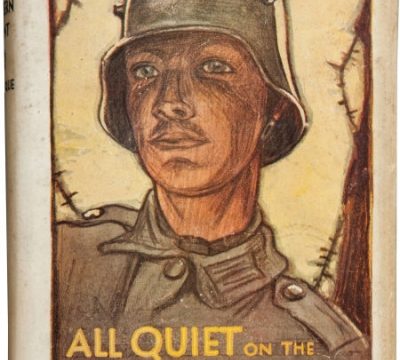All Quiet On The Western Front (in the original German: Westen nichts Neues, “Nothing New in the West”) is a semi-biographical novel by Erich Maria Remarque, a German veteran of World War I. In one of the ultimate cases of “write what you know,” he wrote this great novel about his experiences,being injured there, and how it felt to be in what was, of course, at the time the worst war in human history.
The plot of Quiet is generally simple; our first-person narrator, Paul Bäumer, relates the course of his war experience along with his school friends who have also joined up in the German Army, urged on by their jingoistic schoolteacher. They survive trench battles, deal with deaths among their comrades, scrounge for food, deal with overbearing superior officers and all the part and parcel of being a soldier in wartime. What really distinguishes this from other war novels and made so popular at the time (kept it quite rightly regarded as a classic along with the 1930 film adaptation) is the great writing and depth of feeling for its subject).
Remarque obviously had great and harsh feelings about his experiences in World War I, widely regarded as one of the dumber wars to ever happen for no particular reason. This isn’t a novel about the meaning of war, but rather the utter futility and meaningless of it and the jingoism of sending young men off to die for no good reason but for old men to have a war and such things as “national honor.”
That last bit is what really interests me as to the time this novel comes out; 1928 is only ten years after the humiliating end of WWI for the Germans, who were smarting badly at how disastrous a war it was for them and how they had been treated in the aftermath. Meanwhile, Hitler’s rise to power is only a few years in the future on the shoulders of a new extreme nationalism for Germans. Remarque rejects all of this (not that he is by any means anti-German in this; his memories of home visits are tender, if bittersweet, as he compares home to the horrors of the front).He’s much more interested in confronting the insanity of the war than looking for revenge.
And that confronting rather than revenging is what made Quiet such a favorite target of nationalists over the next decades in Germany; the Nazis ended up banning and burning the novel while Remarque fled the country and eventually settled in the USA. (They didn’t waste time either; Goebbels banned it less than a month after he took office in 1933.) The Nazis certainly didn’t want a novel that wasn’t interested in portraying Germany as a victim and actually asked readers to confront the failings of a country that went to war, like every other country involved, for nothing.
After all of that, what’s left is the legacy of Quiet, which is a towering presence in the genre of soldiers’ narratives; it’s grown to overshadow its one great predecessor, The Red Badge Of Courage, and influences all of its descendants in novels like Catch-22 and The Things They Carried. You can feel the bones of Remarque’s hatred of ceaseless, useless war in many forms through the years, even in nonfiction (there’s a touch of it in the excellent Iraq Invasion novel Billy Flynn’s Long Halftime Walk).
1928 is overall a fascinating year for culture, halfway between WWI and WWII and at the start of the Great Depression. People are reconsidering the war ten years gone while clouds start gathering for the next conflagration, the Jazzy ‘20s are starting to give way to a grim period of retrenching and darkness, but flashes of humor in the culture are about to explode as Hollywood really ramps up. Quiet is a grand example of all of this, a classic for a reason and absolutely something worth discovering if you’ve never had reason to read it before.
(As a final note, the 1930 movie is completely worth your time, one of the few Best Picture wins from back in the day that I have zero problem with.)

